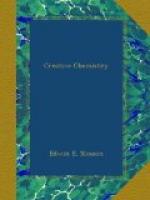But the tide of war set the other way and the German plantations of palmnuts and peanuts in Africa have come into British possession and now the British Government is starting an educational campaign to teach their farmers to feed oil cake like the Germans and their people to eat peanuts like the Americans.
The Germans shut off from the tropical fats supply were hard up for food and for soap, for lubricants and for munitions. Every person was given a fat card that reduced his weekly allowance to the minimum. Millers were required to remove the germs from their cereals and deliver them to the war department. Children were set to gathering horse-chestnuts, elderberries, linden-balls, grape seeds, cherry stones and sunflower heads, for these contain from six to twenty per cent. of oil. Even the blue-bottle fly—hitherto an idle creature for whom Beelzebub found mischief—was conscripted into the national service and set to laying eggs by the billion on fish refuse. Within a few days there is a crop of larvae which, to quote the “Chemische Zentralblatt,” yields forty-five grams per kilogram of a yellow oil. This product, we should hope, is used for axle-grease and nitroglycerin, although properly purified it would be as nutritious as any other—to one who has no imagination. Driven to such straits Germany would have given a good deal for one of those tropical islands that we are so careless about.
It might have been supposed that since the United States possessed the best land in the world for the production of cottonseed, coconuts, peanuts, and corn that it would have led all other countries in the utilization of vegetable oils for food. That this country has not so used its advantage is due to the fact that the new products have not merely had to overcome popular conservatism, ignorance and prejudice—hard things to fight in any case—but have been deliberately checked and hampered by the state and national governments in defense of vested interests. The farmer vote is a power that no politician likes to defy and the dairy business in every state was thoroughly organized. In New York the oleomargarin industry that in 1879 was turning out products valued at more than $5,000,000 a year was completely crushed out by state legislation.[2] The output of the United States, which in 1902 had risen to 126,000,000 pounds, was cut down to 43,000,000 pounds in 1909 by federal




